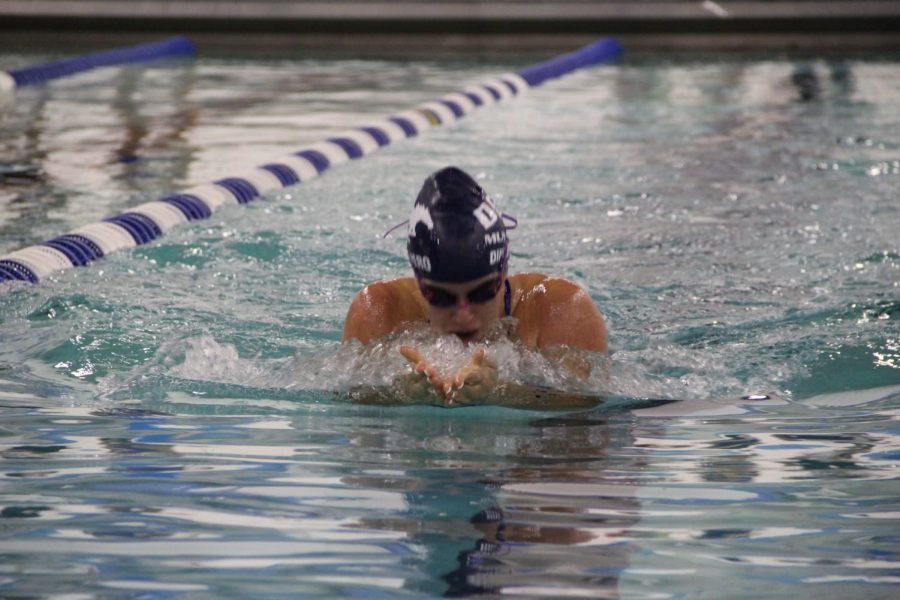Superstitious athletes use routines to be successful in their sport
Sophomore Payton Diprospero’s behind-the-blocks routine helps her race to victory.
Boston Red Sox shortstop Nomar Garciaparra steps up to bat. In less than 20 seconds, Garciaparra has tugged each batting glove three times, kicked each foot in the dirt, crossed himself and windmilled his bat five times. Everything needs to be tightly adjusted, and this routine must be completed for Garciaparra to bat.
But why does Garciaparra do this? Why do so many athletes have pre-event routines or similar superstitions? Do these routines actually do anything?
Superstitions and routines allow athletes to find a small level of control. In sporting events, whether they are on the baseball field, the basketball court, or the track, anything can happen. Having a routine allows for confidence and calmness in the midst of chaotic situations that sports throw at athletes.
 Junior Addy Bryant has played volleyball for eight years and likes to chew gum and listen to music before her games.
Junior Addy Bryant has played volleyball for eight years and likes to chew gum and listen to music before her games.
“I don’t know why, I just feel like I play better when I do it [chew gum], there’s no real reason. And the music is just to get my head in the game, like Troy Bolton said,” Bryant said.
Music is a common pre-competition routine that is actually more than a superstition. According to the National Center for Health Research, music can prevent fatigue as songs with faster beats have been proven to cause athletes to work harder and go farther without being tired. Listening to music has also been linked to an increase in serotonin levels, otherwise known as the “feel-good hormone.”
Listening to music is part of many professional athletes’ competition regimens. The most-decorated Olympian and greatest swimmer of all time, Michael Phelps, is rarely seen behind the starting blocks without headphones on. Gymnastics queen Simone Biles also loves listening to music, specifically Beyoncé and Megan Thee Stallion.
Whether it is used to help them calm down or get them excited to compete, music is a great routine that is proven effective.
Another way athletes prepare for their competitions is with different types of food. Although many athletes prefer to eat healthy before a race, freshman Dani Borchers likes to eat Fun Dip during her swim meets.

“I’ve been doing it for 5 years; I feel like it will make me go faster. My friend used to [eat it] as well, but then she quit swimming. Fun Dip is not my favorite snack, but it is amazing,” Borchers said.
Although it is not her favorite, Borchers can always be seen eating the sugary treat as she prepares for her races. Perhaps the sugar gives her energy to stay strong for all of her swims.
Usain Bolt also had a rather unhealthy diet in the 10 days leading up to the Beijing Olympics. He ate 100 McDonald’s McNuggets a day, apple pie and fries. Somehow, this odd routine worked and Bolt won a gold medal.
Different things work for different people. For junior Sam Sanchez, he believes that wearing all blue clothes before a cross country race will help him run fast.

“My superstition is wearing as much blue as possible to get the good luck going…I think it helps me, it helps me with my confidence – I know that I can do my best in this, on the course and also while I’m training as well,” Sanchez said.
He added that he even goes so far as to wear blue socks or underwear. He knows what works for him, and dressing in a lot of blue is what makes him the most confident and allows him to run fast.
Athlete superstitions are similar to the placebo effect. Often, doctors prescribe placebo drugs without telling patients that their prescription is truly just a sugar pill. Thinking that they are taking an actual drug, patients miraculously start to feel better due to their belief in that real drug.
Sports, like these placebo experiments, are very much a mental game. Believing that something is making you better often does increase your performance, even if the physical thing you believe in is really doing nothing. For example, Sanchez wearing a blue pair of socks doesn’t actually make a difference, but his belief that wearing the socks makes him better increases his performance.
Sophomore Payton Diprospero has a very unique superstition. Most swimmers like to jump around, swing their limbs, or slap their arms and legs before races, but Diprospero does the opposite – she can’t slap herself at all during a meet.
“Every time I would slap myself before a race, I would do terrible, and every time I haven’t, I’ve dropped time,” Diprospero said.
She went on to add how other people also can’t slap her or she will swim poorly. Despite countless high school and professional swimmers doing the loud muscle-slaps, Diprospero has found that it does not work for her, proving that different superstitions work for different people.
Whether it’s listening to music, eating a specific food, wearing a certain piece of clothing or doing a special routine, all athletes have some special superstition that helps them feel in control of their competitions. Like a placebo, these superstitions aren’t always scientifically proven, but they definitely help athletes perform at their best. From Usain Bolt’s chicken nuggets to Nomar Garciaparra’s extensive at-bat routine, athlete superstitions allow competitors to go for the gold.






![In this documentary, you will learn how violins are made. All music is in the public domain:
Music Produced by Deutsche Grammophon, Medici TV, Heifetz Institute, and Queen Elisabeth competition
Paganini, Caprice No. 24 [Song recorded by Jasha Heifetz]. Heifetz Institute. (Original work published 1817)
Paganini, Caprice No. 24 [Song recorded by Jasha Heifetz]. Heifetz Institute. (Original work published 1817)
Bartok, Sonata No.1 for Solo Violin [Song recorded by Kevin Zhu]. Queen Elizabeth Competition. (Original work published 1944)
Paganini, Violin Concerto no. 1 [Song recorded by Philippe Hirshhorn]. Queen Elizabeth Competition. (Original work published 1819-1825)](https://southblueprint.com/wp-content/uploads/2025/05/Screenshot-2025-05-07-122429-600x334.png)

